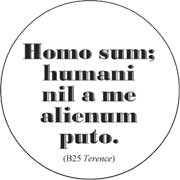My skin first began to prickle when this Jazz Shaw character put quotation marks around the words "identifies as male" and "gender assigned". The quotation marks display the fact that this writer is either being sarcastic or clearly does not want their* readers to believe they think John (or anyone) identifying as such is legit. But then my skin went into full on curdle at the predictable repulsive gem "politically correct". The only people who use that term seriously do so in effort to deride others for being considerate to other humans and as a means to dissuade others from seeking ways to reduce the harm they do with their language/actions. Seriously, whenever I hear/read those words I automatically assume this author is going to be an oppressive asshole to someone and has chosen this moment to refuse to apologize for it in advance.
So yeah, this writer has a serious problem, and NO it's not the problem they refer to at the end of their article. Which I guess is the problem of confusing our children with the complexities of gender or something? “children around the world are looking at [John] and thinking, “I wonder if that’s who I am too?” This is not a solution. It’s a problem.”
UGH! Just NO. No. No.
By Shaw's decree all parents should be saving their children from the dangerous corruption of anything outside cisgender and cissexual experiences. This is troubling in 3 very distinct ways:
1. It is deeply transphobic. It assumes that there is something bad or damaging not just about being trans, but also that just knowing that gender and sex can mean more than just man/woman and male/female is somehow harmful. (hey almost like how some idiots used to think all gay men are pedophiles huh?)
2. It disrespects the agency of one child in particular and all children in general. Assuming that a child doesn't know what they need and that the adults know better. Just because it is a child's decision to look, act, or speak in a particular doesn't mean that that decision is less valid or real. Which leads me nicely into
3. It's hurtful to non-binary people like me who DO go through radical changes in our desires to express our genders. It tells anyone with a gender that is too complex to fit into a tidy spot on a narrow spectrum all of the fucking time that our experiences are too confusing, and inappropriate for children. It erases us. It calls us obscene.
I was particularly pained by Shaw's mournful cry of "What is to become of this little girl". And their trying to explain away young Pitt-Jolie's behavior as temporary. As if temporary-ness of someone's explicitly stated expression or identity is reason enough to ignore and invalidate them. My family members pull this shit with me sometimes. And when they mourn my decision to not have children and the beauty I coulda been or whatever and it hurts in a way that sticks with me. It's just a change dammit not a fucking funeral. Seriously, people respect it when names are changed for marriage, even though about half of those things end up being pretty temporary.
I don't mind the above being faulted as unnecessarily venomous. I can risk being called that today because this morning my twitter stream was filled with necessary discomfort of confronting suicide within the trans community. Specifically the suicide of transgender youth. It's why I found Shaw's disrespectful article so particularly revolting. Because it espouses the exact attitudes that prevent adults from providing trans kids with access to life saving resources.
No. Not on a day like today**. I just can't let a thing like that stand. No more transphobic hand wringing. I've had enough.
PS:
Now that I've verily skewered Shaw, I do want
to say that there's one point on which we probably agree (but for differing reasons). And this is a hard thing for me to fess up to because boy do I ever want me an adorable transmasculine spokesperson who goes by the pronouns I prefer, but dammit, John is 8 years old. They're not an actor or someone who's chosen public life. Their gender or gender expression should not be something we're morbidly interested in. But we are, because part of celebrity culture is about obsessing over and criticizing the family and parenting decisions of famous people. Which is weird and creepy. Let's not do that.
*I very intentionally chose to refer to Jazz Shaw by "they/them/theirs" in this article. Yes, I neglected to the research Shaw's preferred pronoun. In this case alone I'm proud to return the misgendering fire. For John, my dapper little sibling in arms.
**Today is only special because I am hearing about the loss of one of my trans siblings. These losses happen all the time. On Transgender Day of Remembrance, we read a list naming the people we've lost to violence and suicide. These lists are so long that you can't make it to through them without ending up numb, checked out, or chocked up, with your face in your hands. All slippery hot from the accumulation of ache and fury.


